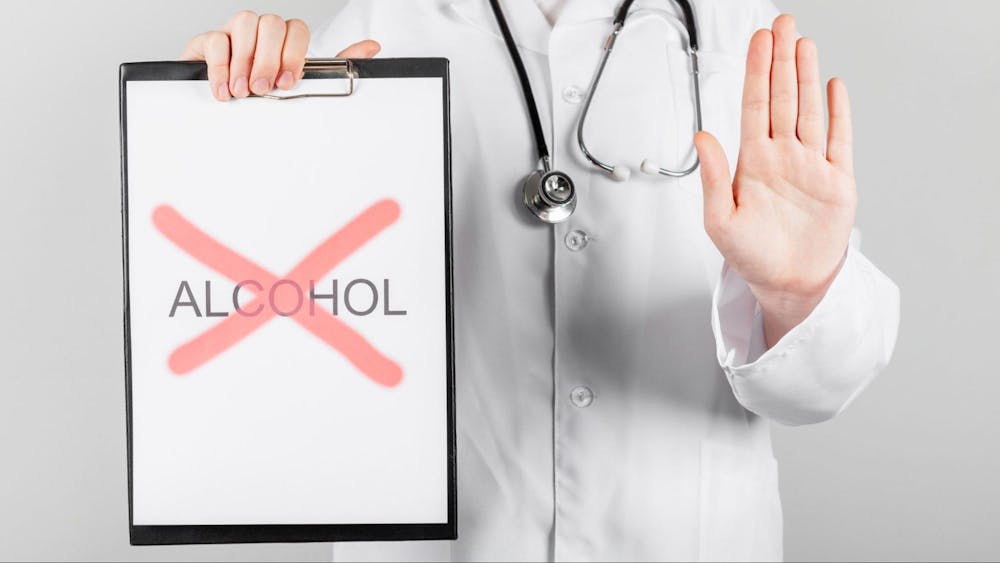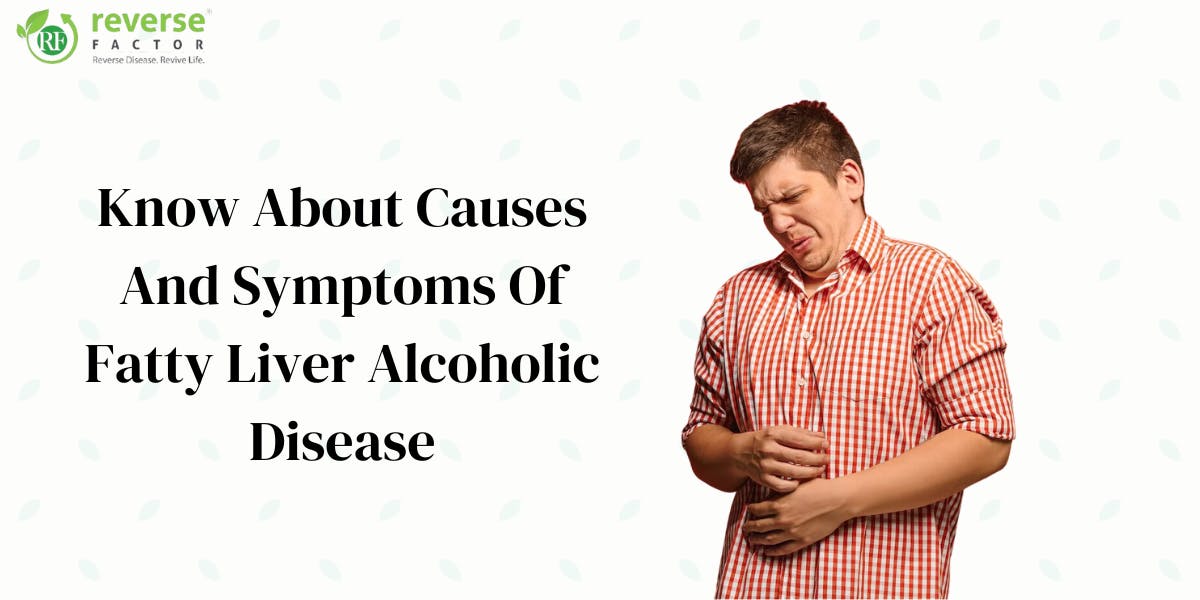Alcoholic Fatty Liver Disease is a serious health problem that affects many people worldwide. Those suffering from symptoms of fatty liver alcoholic health conditions must understand the symptoms to take the best actions for their health. People who are living with poor liver function often complain that they haven’t noticed any symptoms at the early stage. That’s quite true. Most people can experience the symptoms of alcoholic liver disease when the disease progresses. To prevent chronic liver disease, it’s crucial to learn about symptoms of alcohol-related liver disease and opts for fatty liver disease reversal. Reverse Factor is a trusted health program in India that focuses on a healthy diet and exercise to prevent the progression of the disease. In this blog, we will explain AFLD in simple terms. We will focus on its causes and symptoms, to help individuals suffering from liver disease. So, keep reading to improve your liver health!

What is Alcoholic Fatty Liver Disease?
Alcoholic Fatty Liver Disease is liver damage caused by excessive alcohol consumption. When you drink alcohol in excessive amounts, your liver tries to break it down. It causes fat to build up in your liver, which can lead to scarring in the liver if not treated.

Take Control Of Your Hormonal Health By Reading : Everything You Should Know About Hormonal Imbalance In Women
How Drinking Excessive Alcohol Causes Alcohol-Related Liver Disease?
Your liver is like a hardworking filter that helps digest the things you consume and drink. However, unlike food, alcohol is difficult for the liver to break down. When you consume too much alcohol, your liver struggles to process it which results in fat build up in your liver cells. This fat accumulation is what causes alcohol-related liver disease. Therefore, it’s important to take preventive steps like a fatty liver reversal diet in your health plan. This can help you keep your liver in good condition reducing the chances of liver transplantation.

Having Sleep Issues? Check This : Improve Your Sleep These 21 Proven Tips - Prepare To Be Amazed by #4!
What Are The Four Main Stages Of Alcohol-Related Liver Disease?
Alcoholic Fatty Liver
In this early stage, excessive alcohol intake leads to the accumulation of fat in the liver tissue. It is usually reversible if you stop drinking alcohol.
Early Symptoms Of Liver Damage
You might experience the following symptoms of alcoholic liver disease at early stages-
- Inflammation of the liver
- Digestive issues
- Fatigue
- Unexplained weight loss
- Appetite changes
- Mood swings
- Nausea and vomiting
- Dark urine
- Pale stools
Discover Plant-Protein Sources : 21 Top Sources of Plant-Based Protein: A Complete Guide
Alcoholic Hepatitis
As alcohol use continues, the liver inflammation increases, resulting in severe alcoholic hepatitis. Symptoms of liver damage caused by excess alcohol at this stage include abdominal pain, jaundice, and fatigue. These are all warning signs of liver damage that you should never ignore.
Alcohol Induced Hepatitis Symptoms
Here is a list of acute alcoholic hepatitis symptoms that can occur after many years of heavy alcohol intake.
- Higher heart rate
- Pain in the liver area
- Loss of appetite
- Jaundice
- Skin sensitivity
- Nausea and vomiting
- Muscle aches
Fibrosis
If you still continue drinking alcohol, your liver's inflammation might lead to scar tissue formation. Your liver tries to heal itself, but the presence of scar tissue interferes with its regular function.
Alcoholic Fatty Liver Disease Symptoms From Fibrosis
Here are some liver problems early symptoms that might be present when AFLD progresses to the fibrosis stage:
- Hypertension
- Bleeding from the upper digestive tract
- Pain in the upper right abdomen
- Risk of infections
- Liver cancer
- Kidney Failure
Cirrhosis
Cirrhosis is a serious liver disease in which the liver is extensively damaged and loses its capacity to function correctly. In this end-stage liver disease, you might experience symptoms of liver failure due to alcohol consumption in excessive amounts. The cirrhosis of the liver causes permanent damage at this point, and the focus changes to preventing your liver from further damage.
Signs And Symptoms Of Liver Cirrhosis
Given below are alcoholic liver cirrhosis symptoms that occurs at a later stage –
- Inflammation And liver cell damage
- Edema
- Fiver and cold shivering
- Itchy skin
- Fatigue
- Blood in vomit and stools
- Dark urine
- Easy bruising and bleeding
- Increased sensitivity to alcohol and drugs
Common Symptoms Of An Alcoholic Fatty Liver
An alcoholic fatty liver disease can cause a variety of fatty liver disease symptoms, although some people may not detect any early signs and symptoms. Here are some common symptoms of alcoholic fatty liver disease that might occur:
Fatigue
In an alcohol-related fatty liver disease, you will feel exhausted and drained most of the time even after getting enough rest.

Abdominal discomfort
You can experience pain or discomfort in the upper right side of the abdomen due to inflammation in your liver.

Unexplained weight loss
Losing weight without trying can be alarming symptoms of a fatty liver from alcohol.

Jaundice
You can also suffer from Jaundice. It is a disorder that causes the skin and eyes to turn yellow.

Loss of appetite
In more severe cases where the liver grows enlarged and becomes noticeable. It is one of the major liver failure symptoms from alcohol.

What Are The Risk Factors Of Alcoholic Fatty Liver Disease?
Liver disease is caused by many other factors that can damage your liver.
Drinking too much alcohol
The more alcohol you consume regularly, the greater your risk of developing AFLD.
Gender
Women are more prone than men in experiencing alcohol-related liver damage.
Obesity
Being overweight can increase your risk of enlarged liver, especially if you drink excessively.
Infections
People with alcoholic hepatitis B or C have increased liver damage.
Genetics
Your family history and genetics can sometimes make you more susceptible to get fatty liver disease.
What Is The Safest Treatment Of Alcoholic Fatty Liver Disease?
Medications and liver transplant may be required for those who are experiencing severe symptoms of liver toxicity from alcohol. However, you can take care of your health and stop the progression of the disease by making some lifestyle changes and adopting a healthy diet. Alcoholic Fatty Liver Disease (AFLD) can affect anyone who consumes too much alcohol. If you're concerned about alcohol-related liver disease, there's some good news - you can make changes that will help your liver stay healthy. The best treatment is to stop drinking alcohol to prevent further damage. If you're used to drinking a lot, try reducing the amount gradually. Consider switching to a plant-based diet high in fruits and vegetables. These natural foods provide essential nutrients that support liver health and help it repair itself. People with alcoholic liver disease must also practice regular exercise to care for their liver. It doesn't have to be intense; simply going for a walk or practicing gentle yoga might be beneficial.
Let’s Take A Pledge For Better Health
Your liver is a remarkable organ that has an incredible ability to heal and recover with the right care. By learning the symptoms of liver damage from alcohol, you have already taken a great step toward a healthier future. If you find yourself on a route that leads to AFLD, remember that you can change it. All you need to do is make small and healthy changes in life to support your liver health and overall well-being.
Frequently Asked Questions –
1. What are liver cirrhosis early symptoms?
Early alcoholic cirrhosis or liver cancer symptoms include fatigue and weakness, abdominal discomfort or pain.
2. What are the symptoms of liver damage due to alcohol?
Fatigue, bloating, abdominal pain, jaundice, and unexplained weight loss are all symptoms of alcoholic fatty liver disorder.
3. Can we prevent alcohol-related liver disease symptoms?
Yes, it is possible to reverse the disease in the early stages with a healthy diet and the right lifestyle improvements. It will provide long-term benefits for your liver.
4. What are fatty liver symptoms in females?
Women who have fatty livers may experience fatigue, bloating in the abdomen, and skin conditions like itching.
5. How important is it to recognize and address these symptoms?
Early detection is essential because treating symptoms quickly can stop future liver damage. Consider for a liver transplant if you are experiencing severe symptoms.




